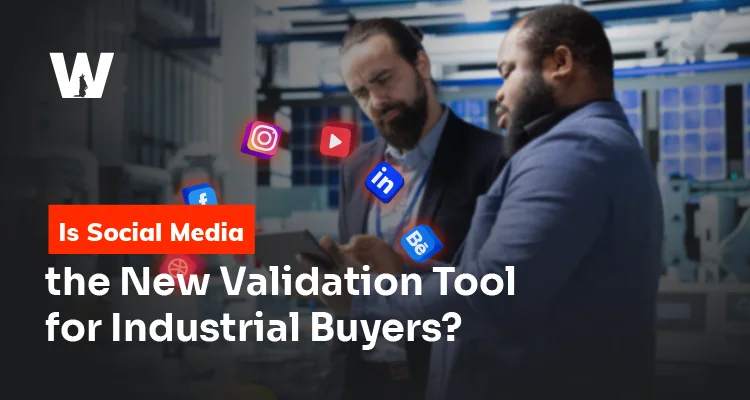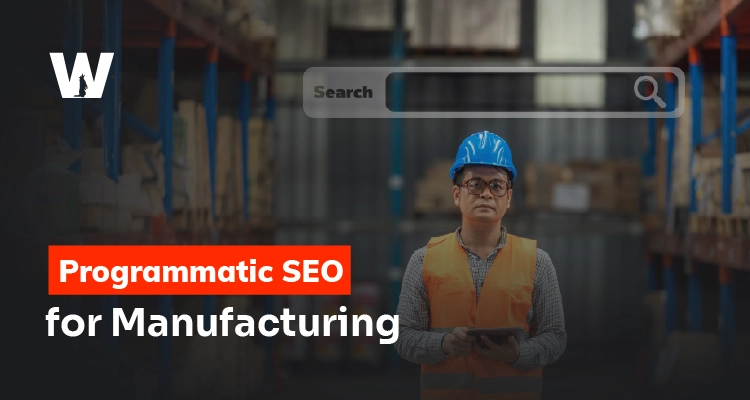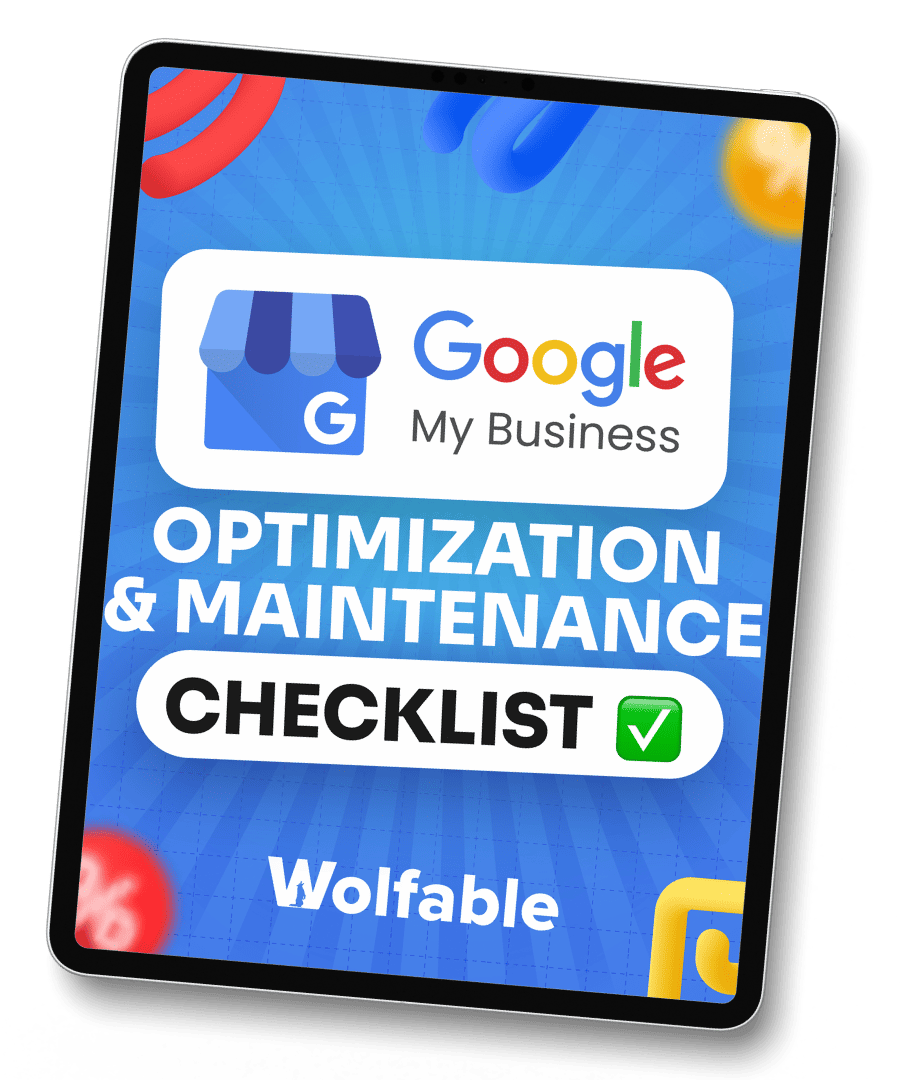Wraps up in 7 Minutes
Picture this: You're an industrial buyer tasked with sourcing a critical component for your manufacturing line.
The decision you make could impact production schedules, quality standards, and your company's bottom line.
Where do you turn first to research potential suppliers?
If you're like most modern industrial buyers, you probably start with a Google search, but you don't stop there.
You check out the supplier's LinkedIn page, scroll through their recent posts, read comments from other customers, and maybe even look up the company's employees to see what they're sharing about their work culture and expertise.
This isn't just casual browsing – it's become a crucial part of your validation process. You're using social media to get a real, unfiltered look at who you might be doing business with. And you're not alone in this approach.
In this comprehensive guide, you'll discover how social media has transformed the way industrial buyers validate suppliers, why it matters more than ever for your business, and most importantly, how you can leverage these platforms to build trust, credibility, and ultimately drive more sales in the industrial space.
How Industrial Buying Has Changed?
Remember when industrial purchasing meant flipping through thick catalogs, attending trade shows, and relying heavily on personal relationships built over decades?
Those days aren't completely gone, but they've certainly taken a backseat to a more sophisticated, research-driven approach.
The transformation has been remarkable. Just fifteen years ago, you probably waited for sales reps to knock on your door with product information. You made decisions based on limited data, vendor presentations, and whatever insights you could gather from your immediate network.
The supplier controlled most of the information flow, and you often had to take their word for it when it came to capabilities, reliability, and performance.
Fast forward to today, and you're in the driver's seat. You have access to an unprecedented amount of information about potential suppliers before you ever have that first conversation.
You can research their financial stability, read reviews from other customers, watch videos of their manufacturing processes, and even get insights into their company culture – all from your office computer or smartphone.
This shift has fundamentally changed your expectations as an industrial buyer. You expect transparency.
You want to see proof of claims, not just hear about them. You're looking for suppliers who are open about their processes, honest about their limitations, and willing to share authentic stories from their customers. In other words, you want to validate everything before you commit.
What's driving this change? Several factors are at play.
First, you have more options than ever before. Globalization has opened up supplier networks worldwide, which means more competition but also more choices to evaluate.
Second, the stakes have gotten higher. With tighter margins and increased pressure to optimize every aspect of operations, making the wrong supplier choice can have serious consequences.
But perhaps most importantly, the tools for research and validation have become incredibly sophisticated and accessible. Social media platforms, review sites, industry forums, and digital content libraries have put a wealth of information at your fingertips. You can now peek behind the curtain and get authentic insights into how suppliers operate, how they treat their customers, and whether they can truly deliver on their promises.
The most successful suppliers today understand that modern industrial buyers want to validate everything.
They've adapted by becoming more transparent, more accessible, and more willing to let their work speak for itself through digital channels.
The Role of Social Media in Building Buyer Confidence
When you're evaluating a potential supplier for a critical industrial purchase, confidence isn't just nice to have – it's essential.
You need to feel certain that the company you're considering can deliver on its promises, handle challenges professionally, and maintain consistent quality over time.
This is where social media has become an unexpected game-changer in the industrial buying process.
Social media platforms offer you something that traditional marketing materials and sales presentations can't: authentic, unfiltered insights into how a supplier actually operates. Unlike polished brochures or carefully crafted case studies, social media content tends to be more spontaneous and genuine.
You can see how companies handle both successes and setbacks, how they interact with customers in real-time, and what their day-to-day operations actually look like.
Social media also provides you with access to peer validation in ways that were impossible before. You can see comments and interactions from other industrial buyers who work with the supplier. You can observe how the supplier handles questions, complaints, or requests for information.
This peer-to-peer insight is incredibly valuable because it comes from people who face similar challenges and have similar needs to yours.
Perhaps most importantly, social media humanizes the supplier relationship. In industrial buying, you're not just purchasing products or services – you're entering into a partnership that may last for years.
Social media lets you get to know the people behind the company. You can see posts from their engineers, learn about their company culture, and get a sense of whether these are people you'd want to work with long-term.
For many industrial buyers, social media has become a critical confidence checkpoint before moving forward with significant purchasing decisions.
It's where you go to validate initial impressions, confirm capabilities, and get a gut check on whether a supplier aligns with your company's values and expectations.

Why Social Media Matters for Industrial Buyers
Now that you understand how social media builds buyer confidence, let's dive deeper into the specific reasons why these platforms have become indispensable tools.
Trust & Transparency
Trust is the foundation of any successful industrial partnership, and social media provides unprecedented visibility into how suppliers actually operate.
When you're evaluating a potential partner, you want to see evidence that they're honest, reliable, and forthcoming about both their strengths and limitations.
Social media delivers this transparency in real-time. You can observe how suppliers communicate with their audience, whether they share honest updates about challenges they're facing, and how they handle questions or concerns from customers.
Companies that regularly post authentic content about their operations, openly discuss industry trends, and share both successes and learning experiences demonstrate a level of transparency that builds trust.
You can also verify claims and capabilities through social media content. If a supplier claims to have state-of-the-art facilities, you can see photos and videos of their actual workspace.
This visual and social proof helps you separate genuine capabilities from marketing fluff.
Peer Influence
Your fellow industrial buyers are incredibly valuable sources of validation, and social media makes their insights more accessible than ever before.
When you see other professionals in your industry engaging positively with a supplier's content, commenting on their posts, or sharing their experiences, it carries significant weight in your decision-making process.
This peer influence works on multiple levels. You can see which companies are following or engaging with potential suppliers, giving you insights into their customer base and market position.
You can read comments and discussions that reveal real experiences from other buyers. Sometimes, you can even reach out directly to peers who have experience with suppliers you're considering.
LinkedIn, in particular, has become a powerful platform for peer validation.
When you see industry leaders from reputable companies engaging with a supplier's content or sharing positive experiences, it serves as an implicit endorsement that's often more valuable than traditional testimonials.
Content Validation
Social media allows you to validate supplier claims through the content they share and how others respond to it.
When a supplier posts about a successful project, innovative solution, or industry achievement, you can gauge the authenticity of these claims based on community response and engagement.
Authentic content typically generates genuine engagement from industry peers, customers, and partners. If a supplier consistently shares content that receives meaningful comments, shares, and discussions from credible sources, it suggests that their claims and capabilities are legitimate.
Conversely, content that receives little engagement or seems disconnected from industry conversations might indicate inflated claims or limited market presence.
This content validation helps you assess whether a supplier truly understands your industry and challenges.
Reputation Check
Social media provides a comprehensive view of a supplier's reputation across multiple touchpoints and timeframes.
Unlike traditional reference checks that might only capture a snapshot or selected positive experiences, social media offers a broader, more nuanced picture of how a company is perceived in the market.
You can observe patterns in how suppliers interact with customers, handle complaints, and respond to industry discussions. This ongoing reputation monitoring helps you identify potential red flags or concerns that might not surface in formal sales conversations.
You can also see how suppliers position themselves in relation to competitors and whether their market reputation aligns with their sales messaging.
This personal dimension of reputation checking adds valuable context to your supplier evaluation.
Faster Due Diligence
Perhaps one of the most practical benefits of using social media for validation is the speed at which you can gather information.
Traditional due diligence processes might take weeks or months, involving formal requests for information, reference calls, and site visits. Social media allows you to conduct preliminary due diligence much more quickly and efficiently.
You can rapidly assess a supplier's market presence, financial stability indicators, customer satisfaction signals, and industry standing through their social media footprint. While this shouldn't replace thorough due diligence for major purchases, it can help you quickly qualify or disqualify potential suppliers early in your research process.
This faster validation process is particularly valuable when you're dealing with tight timelines or need to evaluate multiple potential suppliers.
Social media research can help you narrow your list of candidates more efficiently, allowing you to focus your detailed evaluation efforts on the most promising options.
Benefits of Using Social Media as Validation
While we've explored why social media matters from the buyer's perspective, it's equally important to understand the significant benefits that suppliers gain when they effectively leverage social media as a validation tool.
Enhanced Brand Visibility
Social media dramatically expands your visibility in the industrial marketplace, putting your brand in front of potential buyers who might never have discovered you through traditional channels.
Unlike trade publications or industry directories that have limited reach and high costs, social media platforms give you the ability to showcase your capabilities to a global audience of industrial buyers.
When you consistently share valuable content about your projects, expertise, and industry insights, you increase the likelihood that buyers will discover your company during their research phase.
This organic discovery is particularly powerful because it happens when buyers are actively seeking solutions, making them more receptive to learning about your capabilities.
Shortened Sales Cycles
One of the most significant advantages of effective social media validation is its impact on sales cycle length.
When potential buyers can research and validate your capabilities through social media before they ever contact you, they enter the sales conversation much further along in their decision-making process.
Instead of starting from scratch with cold prospects who need extensive education about your company and capabilities, you're often dealing with buyers who already have a good understanding of what you offer and confidence in your ability to deliver.
This pre-qualified interest allows your sales team to focus on specific requirements, pricing, and implementation details rather than basic credibility building.
The transparency that social media provides also reduces the time buyers need for due diligence and validation activities.
When they can see evidence of your capabilities, customer satisfaction, and industry standing through your social media presence, they require fewer reference calls, site visits, and formal validation processes.
Customer Advocacy Amplified
Social media transforms satisfied customers into powerful advocates for your business in ways that traditional word-of-mouth marketing never could.
When existing customers engage with your content, share your posts, or comment positively on your updates, they're essentially endorsing your capabilities to their own professional networks.
This amplified advocacy is particularly valuable in industrial markets where peer recommendations carry enormous weight. When a respected industry professional shares or comments positively on your content, their endorsement reaches hundreds or thousands of other potential buyers who trust their judgment.
Customer advocacy through social media is also more authentic and spontaneous than traditional testimonials or case studies.
When customers voluntarily engage with your content or share their positive experiences, it carries more credibility than solicited endorsements. Potential buyers can see these authentic interactions and gauge the genuine satisfaction level of your customer base.
Global Reach
Social media eliminates geographical barriers that traditionally limited industrial suppliers to local or regional markets.
Through strategic use of these platforms, you can establish credibility and validation with potential buyers anywhere in the world, opening up new market opportunities that would have been difficult or impossible to access through conventional marketing approaches.
This global reach is particularly valuable for specialized suppliers who serve niche markets. Social media allows you to connect with buyers who need your specific capabilities, regardless of their location.
You can build relationships and establish trust with international prospects long before considering formal market entry or sales expansion.
The global nature of social media also allows you to leverage success stories and customer advocacy from one market to build credibility in others. When international buyers see evidence of successful projects and satisfied customers, even from different geographical regions, it helps establish confidence in your ability to deliver results globally.
🔍 Ready to win industrial buyers’ trust online? Let’s craft your digital validation strategy.
Best Practices for Suppliers Leveraging Social Media for Validation
Understanding the benefits of social media validation is one thing – implementing effective strategies is another. If you're a supplier looking to leverage social media as a powerful validation tool, you need to approach it strategically and consistently.
Here are the essential best practices that will help you build credibility, trust, and ultimately drive more business through social media platforms.
Optimize LinkedIn presence
LinkedIn should be your primary focus for industrial social media validation, and optimizing your presence there requires attention to multiple elements.
Start with your company page – ensure it clearly communicates what you do, who you serve, and what makes you different. Use professional photography that showcases your facilities, team, and work in action.
Your company description should speak directly to the problems you solve for industrial buyers, not just list your capabilities. Include relevant keywords that buyers might search for, but write for humans, not search engines.
Add your key team members' profiles and ensure they're complete and professional, since buyers often research individual team members as part of their validation process.
Regularly update your company news and milestones to show that you're an active, growing business. Share employee achievements, new certifications, facility improvements, and other indicators of business health.
This ongoing activity signals to buyers that you're a stable, forward-moving organization.
Share Authentic Customer Testimonials and Video Success Stories
Nothing validates your capabilities quite like authentic stories from satisfied customers.
Move beyond traditional written testimonials and embrace video content that shows real customers discussing real results. These video testimonials carry significantly more weight with industrial buyers because they're harder to fake and provide visual and emotional context that written testimonials can't match.
When creating customer success stories, focus on specific challenges, solutions, and measurable outcomes.
Industrial buyers want to see evidence that you can solve problems similar to theirs, so be detailed about the technical aspects and business impact of your work. Include metrics wherever possible – cost savings, efficiency improvements, quality enhancements, or timeline achievements.
When customers see value in being associated with your success stories, they're more likely to participate enthusiastically and authentically.
Consistent Posting Schedule
Consistency is crucial for building trust through social media validation.
Sporadic posting suggests an inconsistent business approach, while regular, valuable content demonstrates reliability and commitment.
Therefore, you should develop a posting schedule that you can maintain long-term – it's better to post quality content twice a week consistently than to post daily for a month and then disappear for three months.
Remember that consistency extends beyond posting frequency to voice, quality, and messaging.
Your social media presence should feel cohesive and professional across all posts, reinforcing the same brand values and capabilities that you want buyers to associate with your company.
Engage in Industry Conversations
Active participation in industry discussions positions you as a knowledgeable, engaged member of your professional community.
Don't just broadcast your own content – comment thoughtfully on others' posts, share relevant industry news with your insights, and participate in LinkedIn groups or Twitter chats related to your field.
When engaging in conversations, focus on adding value rather than promoting your services. Answer questions that other professionals ask, share relevant experiences (without revealing confidential information), and offer insights that demonstrate your expertise.
This approach builds your reputation as a helpful industry resource, which is incredibly valuable for validation purposes.
Leverage Influencer and Partner Validation
Strategic partnerships and relationships with industry influencers can significantly amplify your validation efforts.
For this, you need to identify respected voices in your industry – these might be consultants, analysts, technology partners, or prominent customers – and look for authentic ways to collaborate or engage with them.
Furthermore, you should consider inviting industry experts to contribute to your content, participate in webinars, or speak at events you sponsor. When respected industry figures associate their names with your company, it provides powerful third-party validation for potential buyers.
Partner validation works similarly. Highlight your relationships with established technology partners, distributors, or complementary service providers.
These partnerships suggest that other reputable companies trust and value working with you, which transfers credibility to potential buyers.
Monitor Sentiment and Respond Quickly
Social media moves fast, and your responsiveness can significantly impact how buyers perceive your customer service capabilities.
Set up monitoring tools to track mentions of your company, key personnel, and relevant industry terms so you can respond promptly to questions, concerns, or opportunities for engagement.
When buyers or customers ask questions on your social media posts, respond quickly and helpfully. Even if the question seems basic, remember that your response is visible to many potential buyers who might have similar questions. Use these interactions as opportunities to demonstrate your responsiveness and expertise.
Monitor not just direct mentions but also conversations about your industry, competitors, and related topics.
This broader monitoring helps you identify opportunities to join relevant discussions and stay informed about market sentiment and trends that might affect your business.
Conclusion
The evidence is clear: social media has fundamentally transformed how industrial buyers validate suppliers, and this shift shows no signs of slowing down.
As an industrial supplier, you can no longer afford to treat social media as an optional marketing channel. Your potential buyers are already using these platforms to research, validate, and ultimately choose their partners.
The question isn't whether you should be leveraging social media for validation – it's whether you're doing it effectively enough to stand out in an increasingly competitive marketplace.
But developing and executing an effective social media validation strategy while running your core business operations can be overwhelming. You need expertise in content creation, platform optimization, engagement strategies, and performance measurement.
This is where partnering with the right digital marketing agency becomes invaluable.
At Wolfable, we specialize in helping industrial suppliers leverage social media and digital channels to build credibility, accelerate sales cycles, and drive sustainable growth.
We understand the unique challenges and opportunities in the industrial sector because we've been helping companies like yours navigate the digital transformation for years.
Ready to transform your social media presence into a powerful validation tool that drives real business results?
Schedule a consultation with our team today and discover how Wolfable can help you leverage social media to build trust, accelerate sales cycles, and grow your industrial business.









